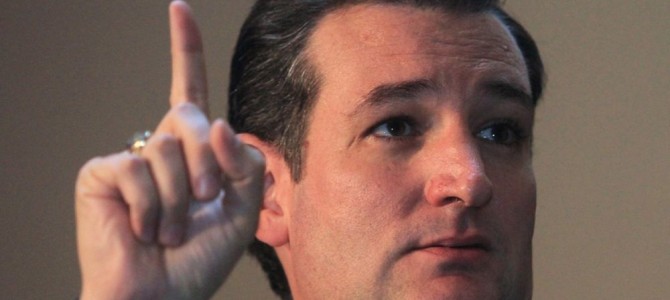
On January 31, presidential candidate Ted Cruz told a crowd of supporters it’s time to “awaken the body of Christ that we may pull back from the abyss.” What abyss? Does he mean the biblical concept of damnation? No, he meant the abyss of a socialized economy and diminished country. Such a fate is certainly sad, but it is not a tragedy of biblical proportions.
As Cruz told the same crowd of supporters, they needed to “strap on the full armor of God, get ready for the attacks that are coming.” Never mind that the same passage in Ephesians that deals with the armor of God declares the war to be spiritual: “For we do not wrestle against flesh and blood, but against the rulers, against the authorities, against the cosmic powers over this present darkness, against the spiritual forces of evil in the heavenly places” (Eph. 6:12).
God’s In My Corner
The day after Cruz’s speech, GOP voters in Iowa traded their church pews for voting sites. Which candidate would be best equipped to slay the Big Government Leviathan? Alongside Cruz was a former pastor in Mike Huckabee, an unapologetic evangelical in Dr. Ben Carson, and Sen. Marco Rubio, who recently gave a basic apologetic for his faith. Even Donald Trump, while attacking Carson’s faith, boasted of his Presbyterianism.
As Cruz predicted, the attacks did indeed come. They came in the form of deception from members of Cruz’s campaign, who spread the rumor that Carson was dropping out of the race. That would surely benefit Cruz, who stands to gain a good bit of Carson’s evangelical support. The normally magnanimous Carson formally accepted Cruz’s apology because his faith demands such forgiveness—Trump could learn a lesson there—but he was clearly not happy.
Sarah Palin, Trump’s surrogate, then engaged in her own attack upon Cruz via his own surrogate, Rep. Steve King. She called King a liar three separate times, before in the same post heartily commending Carson’s charitable, faith-based response. She leveled this attack on behalf of a candidate—Trump—who has repeatedly engaged in vicious attacks and rumor-mongering against his fellow candidates.
Faith Isn’t a Political Lever to Pull
This petty spat by otherwise esteemed politicians shines a light on a great danger in conservative politics at the moment: Using Christianity as a means to a political end. Granted, a politician’s faith should and inevitably will inform his conscience—there is no such thing as checking one’s beliefs at the door. But there is a big problem when a candidate employs his faith to rally voters to polls, claim a moral high ground over tax policy, or justify types of political discourse.
It is dangerous to the church, in that Christians are tempted to define their faith in cultural and political terms. Their battle becomes one of “flesh and blood,” and the lines are drawn between different political ideologies, rather than belief and unbelief. It locates sin in a political opponent, rather than in one’s own heart, obstructing the vital process of conviction, repentance, and renewal in the grace of Jesus Christ.
Using Christianity this way is also dangerous to the state because it cultivates a politicized faith normally considered anathema to conservatives: socialism. Socialism, often rooted in religious rhetoric, re-defines biblical terminology in materialistic terms—sin is found in unfair power structures, salvation comes through political means, and heaven comes in the form of a mythical, utopian state.
Progressivism in the early twentieth century heavily relied upon such religious rhetoric to propel its political myths, often with the express purpose of overturning the Bible and the Constitution—the guiding documents of the church and state, respectively. This ideology was a facet of both political parties and led to the idealism that ruined the Treaty of Versailles and spawned the New Deal. In the process, the church shrank, across the country and across denominational lines.
Hope in Things Higher than 2016
Finally, this sort of rhetoric breeds cynicism toward conservatives and Christianity. Many in our culture already view truth claims as a means to power, and find spiritual truth claims to be especially heinous and dangerous. In large part, this is due to our culture’s gross ignorance about Christianity. Even so, these stereotypes are directly fed by politicians who use their faith to drive up their support, rather than simply inform their conscience and principles.
Christian candidates should follow Rubio’s model in speaking of the importance of Christian faith as putting things in proper perspective. As Rubio told an atheist critic, the eternal perspective created by his faith in Jesus Christ makes him consider being a good husband and father more important than being a good president. For him, Christian faith is not a means to power, but a means to relinquish it in light of the higher good of knowing Christ.
During the rising tide of progressivism, a leading theologian of the day, J. Gresham Machen, reminded his listeners, “This world’s problems can never be solved by those who make this world the object of their desires. This world cannot be bettered if you think that this world is all. To move the world you must have a place to stand.”
Cruz rightly reminds his supporters on a regular basis to pray until Election Day, but they should not be praying for his victory. They should be praying for their leaders (1 Timothy 2), that they would be wise and just (Romans 13). Just as importantly, they should use their prayers to set their minds on things above, where Christ is seated at the right hand of God (Colossians 3).
If Christians—the body of Christ—set their minds on Christ and are guided by his Word rather than the political rallying cries of like-minded politicians, they will find that their zeal will be tempered by joy and their hopes set higher than 2016.









